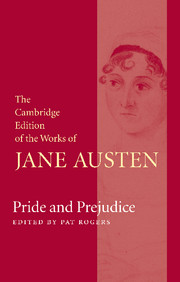Book contents
- Frontmatter
- Contents
- General Editor’s Preface
- Acknowledgements
- Chronology
- Introduction
- Note on the Text
- Pride and Prejudice
- Pride and Prejudice: Volume I
- Pride and Prejudice: Volume II
- Pride and Prejudice: Volume III
- Corrections and Emendations to 1813 text
- Appendix 1 Thomas Egerton and the Publication History
- Appendix 2 Legal and Military Background
- Appendix 3 Pemberley and its Models
- Appendix 4 Note on the second and third editions of Pride and Prejudice
- Abbreviations
- Explanatory Notes
Chapter 11
Published online by Cambridge University Press: 19 December 2020
- Frontmatter
- Contents
- General Editor’s Preface
- Acknowledgements
- Chronology
- Introduction
- Note on the Text
- Pride and Prejudice
- Pride and Prejudice: Volume I
- Pride and Prejudice: Volume II
- Pride and Prejudice: Volume III
- Corrections and Emendations to 1813 text
- Appendix 1 Thomas Egerton and the Publication History
- Appendix 2 Legal and Military Background
- Appendix 3 Pemberley and its Models
- Appendix 4 Note on the second and third editions of Pride and Prejudice
- Abbreviations
- Explanatory Notes
Summary
MR. WICKHAM was so perfectly satisfied with this conversation, that he never again distressed himself, or provoked his dear sister Elizabeth, by introducing the subject of it; and she was pleased to find that she had said enough to keep him quiet.
The day of his and Lydia's departure soon came, and Mrs. Bennet was forced to submit to a separation, which, as her husband by no means entered into her scheme of their all going to Newcastle, was likely to continue at least a twelvemonth.
“Oh! my dear Lydia,” she cried, “when shall we meet again?”
“Oh, lord! I don't know. Not these two or three years perhaps.”
“Write to me very often, my dear.”
“As often as I can. But you know married women have never much time for writing. My sisters may write to me. They will have nothing else to do.”
Mr. Wickham's adieus were much more affectionate than his wife’s. He smiled, looked handsome, and said many pretty things.
“He is as fine a fellow,” said Mr. Bennet, as soon as they were out of the house, “as ever I saw. He simpers, and smirks, and makes love to us all. I am prodigiously proud of him. I defy even Sir William Lucas himself, to produce a more valuable son-in-law.”
The loss of her daughter made Mrs. Bennet very dull for several days.
“I often think,” said she “that there is nothing so bad as parting with one's friends. One seems so forlorn without them.”
“This is the consequence you see, Madam, of marrying a daughter,” said Elizabeth. “It must make you better satisfied that your other four are single.”
“It is no such thing. Lydia does not leave me because she is married; but only because her husband's regiment happens to be so far off. If that had been nearer, she would not have gone so soon.”
- Type
- Chapter
- Information
- Pride and Prejudice , pp. 365 - 374Publisher: Cambridge University PressPrint publication year: 2006

